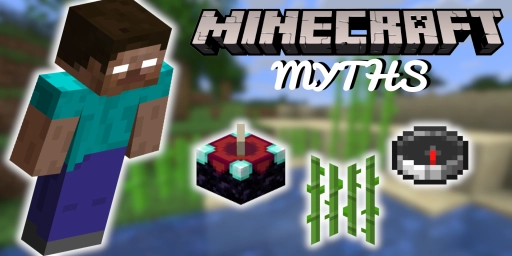With a game as successful and long-lived as Minecraft, it’s no surprise that plenty of myths and misunderstandings have emerged over the years. Whether from playground rumors, Minecraft videos, or the many changes and versions the game has seen over the last 15 years, many misconceptions remain lodged in the zeitgeist and can lead to odd moments in-game. In this post, we put the biggest Minecraft myths under the microscope — and show you what’s actually true.
Minecraft myth: Herobrine — did he ever exist?

Myth: Herobrine, the supposedly deceased brother of Notch, haunts your world and causes unexplained phenomena.
Fact: Notch never had a brother, and Herobrine has never existed in the game. The patch notes saying “Removed Herobrine” were an internal dev joke. Mojang still plays with the meme in marketing — but Herobrine has never made it into the game.
Breaking leaves in Minecraft: Does it affect sapling and apple drops?

Myth: If you break leaves by hand, you get fewer saplings or apples.
Fact: The drop rate is independent of whether leaves decay naturally or you break them yourself. For oaks, the sapling chance is about 5%. With Fortune on your axe, it rises to roughly 10%. Jungle trees have a lower sapling rate overall.
Sugar cane in Minecraft: Does it grow faster on sand or dirt?

Myth: Sugar cane grows faster on sand than on dirt or mud.
Fact: Sugar cane grows at the same speed everywhere. What matters is that it’s placed directly next to water. Growth is governed by random ticks — the block type (dirt, grass, sand, mud) does not matter.
Historical note: The rumor that sugar cane used to be placeable only on certain blocks or even in the End is false. Sugar cane (formerly “reeds”) could be placed early on next to water on dirt/grass/sand; the End dimension was added later.
Desert wells in Minecraft: Archaeology loot since 1.20

Myth: Desert wells are completely useless.
Fact: Since version 1.20 (Trails & Tales) introduced archaeology, desert wells can contain suspicious sand. Use the brush to uncover pottery sherds, emeralds, and other useful items. Also note: Desert wells are not indicators of nearby villages — they generate independently in deserts.
Mob spawning vs. Y-level: Do deeper layers spawn more mobs?

Myth: The deeper you go, the more monsters spawn automatically.
Fact: Spawn rules don’t directly depend on depth. In the Overworld, since 1.18, hostile mobs spawn at light level 0. Deep caves often feel mob-heavier because there are many unlit surfaces and upper areas are already lit. The spawn rate itself does not increase just because you’re deeper.
Torches and light sources: Do they ever burn out in Minecraft?

Myth: Torches go out after a while and need to be relit.
Fact: This was floated as an idea in 2010 but never implemented. In Minecraft, all light sources are infinite. The lantern was added in 1.14 — as a decorative, strong light source, not as a required replacement for “burned-out” torches.
Enchanting table script (SGA): Can it actually be translated?

Myth: The glyphs on the enchanting table tell you which enchants you’ll get.
Fact: The runes use the Standard Galactic Alphabet (SGA) from the Commander Keen series. They’re readable, but don’t reveal the actual enchantments. Since 1.8, the UI shows one guaranteed enchant — additional effects remain random.
Compass mechanics in Minecraft: Does it point to your bed or the spawn?

Myth: The compass points to your bed.
Fact: A normal compass always points to the world spawn — the point where you first load into a world. If you want to set a compass to a different location, you need a lodestone. With that, it works reliably in any dimension (Overworld, Nether, End).
Fortune enchantment: Does it give you more XP?

Myth: Fortune increases not only item drops but also the XP you gain.
Fact: Fortune does not affect experience. XP amounts are defined per block type and random within a range. For more XP, build ore farms, mob farms, or mine ores without Silk Touch so they drop XP directly.
Enchanting table & bookshelves: Proper setup for level-30 enchants

Myth: The enchanting table must be completely and arbitrarily surrounded by books.
Fact: For level 30 enchants you need exactly 15 bookshelves. Rule: The shelves must have one air block of space to the table, and no block may sit between the table and a shelf (not even a torch). The classic 5x5 ring with a free ring of air around the table is common, but other layouts work as long as the rules are followed. More than 15 shelves have no additional effect.
Conclusion on Minecraft myths: What’s actually true
With so many versions and rumors around Minecraft, it’s no wonder a lot of misinformation circulates online. Not everything you hear is true — and some things have changed with updates. Use the facts above to make better decisions in-game and set your friends straight on common misconceptions.
Want to test these myths with friends? Rent your own Minecraft server and get started!
More interesting articles
Minecraft: 10 hidden features you should know
Herobrine: The Truth Behind the Minecraft Myth
Minecraft Community Votes 2017–2023: Winners, losers, and the future of updates




